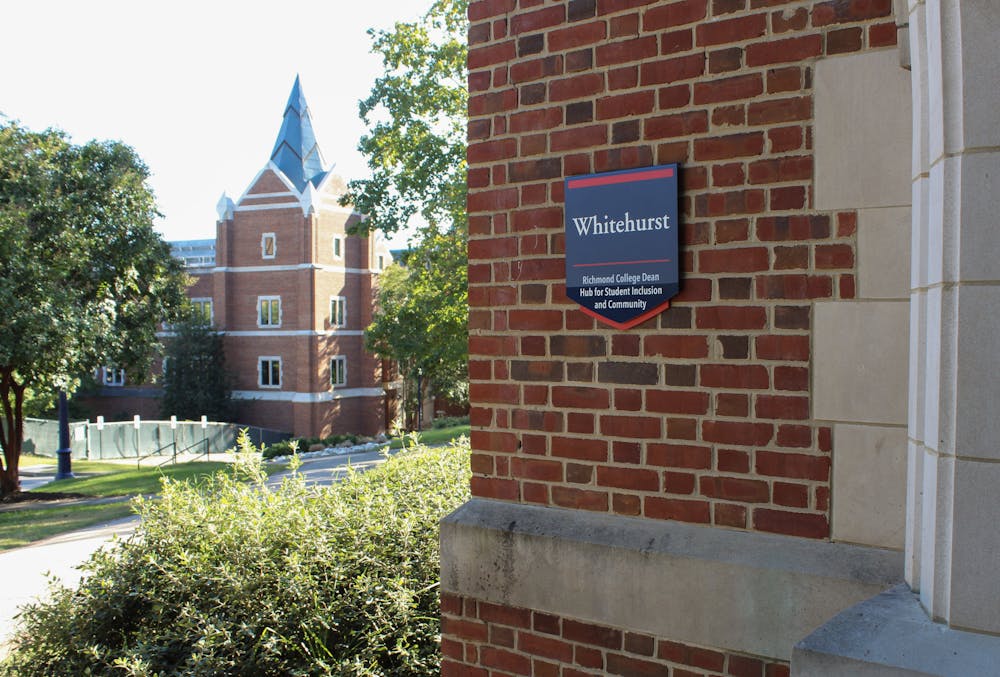University officials denied any connection between a controversial series of changes to certain campus offices and the Trump administration’s attacks on diversity, equity and inclusion programs in higher education at a town hall on Thursday, Oct. 16.
The Black Student Alliance hosted a Town Hall on Thursday to address recent changes on campus, including the removal of the THRIVE pre-orientation program and the renaming of the Student Center for Equity and Inclusion to the Hub for Student Inclusion and Community.
A four-person panel of faculty from the University’s student development, student inclusion, and wellness offices answered student questions submitted to the BSA. The panel included Monica Smith, the Vice President for Inclusion and Belonging, Todd Adams, the Vice President for Student Development, Morgan Russell-Stokes, Dean of Student Inclusion and Community and Aesha Uqdah, the Associate Vice President of Health and Wellbeing.
Many of the questions posed by students asked if the changes were in response to the Trump administration, and the panel maintained that they were unrelated.
“We shouldn’t conflate the changes that are happening with the things that are happening externally,” said Smith.
The first question addressed by the panel was about the end of THRIVE, a weeklong multicultural pre-orientation program, which was replaced by a one-day program called STRIDE. Russell-Stokes said that one reason for the end of THRIVE was a recent decline in student engagement.
“THRIVE attracted about 20 students per cycle, but we have 150 first-year students of color. Hopefully, STRIDE can have more of an impact,” Russell-Stokes said.
Russell-Stokes also said that the decision was made “in an effort not to overtax orientation advisors and our first-year students.” Students who were part of multiple identity groups often faced a more demanding time commitment because of the complex event schedule.
Despite the change, Russell-Stokes emphasized that changes made to pre-orientation aren’t set in stone.
“STRIDE went great, but that doesn’t mean any of the changes that were made were permanent,” Russell-Stokes said.
When the panel was asked why the word “equity” was removed from the official name of the now Hub for Student Inclusion and Community, Adams said that the University still values equity.
“While the name is not there, that doesn't mean that we’ve lost equity as part of the work or as the outcome of the work," Adams said.
Enjoy what you're reading?
Signup for our newsletter
Another question asked whether the university had overcorrected or disregarded its students’ needs. Smith responded that the university always pays attention to new administrations and their impact on higher education.
“We try our best to keep our thumb on the pulse of what this student body needs,” Smith said.
Uqdah responded by saying that the faculty wants to make sure they keep cultural opportunities in place for students.
The panelists also reacted to questions about title changes among the faculty of the Hub, as certain faculty titles have been changed to remove their named association with affinity groups. Smith said that the changes were made to ensure that all faculty would be as accessible as possible to students in need.
“What we don’t want to have happen…is for students to see a particular title, and think that that person can’t help them,” Smith said.
Support and freedom for student groups remained a pressing issue in student questions. When asked whether student groups would have to comply with the new language being used by the administration, Adams said groups were not required to do so. However, Smith emphasized that community events must be open and inclusive to all students.
“As long as everyone is welcome, student groups can continue to do what they’re doing,” Smith said. While the panel said that there wasn’t any direct connection between the actions of the Trump administration and the recent changes at UR, towards the end of the town hall, Smith seemed to imply that the changes were an attempt to avoid scrutiny.
“We did not want to be in a situation where we were made to wipe things out,” Smith said. “Ultimately, we wanted to make sure that we could keep those resources in place for you all.”
Officials did not specify who would force the university to wipe out the previous programs during the town hall.
However, since the start of his term, Trump has threatened to pull federal funds, often in the form of grants or financial aid, from universities and colleges with DEI-related programs. The pressure has shuttered many diversity-related university offices across the country since the start of this year.
Adams also apologized for the initial lack of transparency in the administration after the changes were made.
“The communications around the changes…were left to chance,” Adams said. “There were things that we could’ve and should’ve done better for you.”
At the end of the night, Russell-Stokes also acknowledged that some students are feeling discouraged.
“It’s not lost on us that some of you all may be feeling grief or a sense of loss,” Russell-Stokes said.
When the panel was asked what advice they would give to students struggling to navigate these unprecedented times, Russell-Stokes emphasized the importance of togetherness.
“Community is important now more than ever,” Russell-Stokes said.
Contact city & state writer Megan Bucholtz at megan.bucholtz@richmond.edu and city & state writer Declan Devilbiss at declan.devilbiss@richmond.edu
Support independent student media
You can make a tax-deductible donation by clicking the button below, which takes you to our secure PayPal account. The page is set up to receive contributions in whatever amount you designate. We look forward to using the money we raise to further our mission of providing honest and accurate information to students, faculty, staff, alumni and others in the general public.
Donate Now


